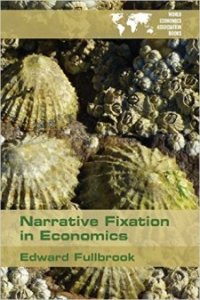From Edward Fullbrook Determinism, the idea that everything that happens must happen as it does and could not have happened any other way, and atomism, the idea that the world is made up of entities whose qualities are independent of their relations with other entities, are fundament components of classical mechanics. Atomism is also central to the concept of mind developed in John Locke’s An Essay Concerning Human Understanding, published (1690) three years after Newton’s Principia. Locke’s general conception of the human mind became commonplace among 18th-century philosophers, so when Adam Smith came to write the foundational text for economics, The Wealth of Nations (1776), he had the example not only of Newton’s material atomism, but also of Locke’s extension of it to an altogether
Topics:
Edward Fullbrook considers the following as important: Uncategorized
This could be interesting, too:
tom writes The Ukraine war and Europe’s deepening march of folly
Stavros Mavroudeas writes CfP of Marxist Macroeconomic Modelling workgroup – 18th WAPE Forum, Istanbul August 6-8, 2025
Lars Pålsson Syll writes The pretence-of-knowledge syndrome
Dean Baker writes Crypto and Donald Trump’s strategic baseball card reserve
from Edward Fullbrook
Determinism, the idea that everything that happens must happen as it does and could not have happened any other way, and atomism, the idea that the world is made up of entities whose qualities are independent of their relations with other entities, are fundament components of classical mechanics. Atomism is also central to the concept of mind developed in John Locke’s An Essay Concerning Human Understanding, published (1690) three years after Newton’s Principia. Locke’s general conception of the human mind became commonplace among 18th-century philosophers, so when Adam Smith came to write the foundational text for economics, The Wealth of Nations (1776), he had the example not only of Newton’s material atomism, but also of Locke’s extension of it to an altogether different area of inquiry. If atomism could form the basis of a theory of ideas, then why not apply it as well to a theory of human beings?
Of course Smith did not limit his vision of economic reality to what could be seen through the metaphysical lens of classical mechanics. But a century later the founders of Neoclassical economics did exactly that and even boasted that they were doing so. Their justification of course – and it was a plausible one at the time – was the enormous success that exclusive devotion to this approach had yielded in physics. In time, especially from the 1960s onwards, undivided allegiance to this determinist-atomistic narrative became, with few exceptions, a basic requirement for making a career in economics.
History, however, has shown that there was a great irony in economics’ decision to become zealously fixated on taking this particular approach toward economic reality. In the same decades that Neoclassical economics was being created, physics was moving rapidly away from its insistence upon the determinist-atomistic narrative and towards narrative pluralism. The achievements resulting from this opening up of physics to other narratives have been even more spectacular than those that came from classical mechanics. Without that intellectual liberation, human reality would be radically different from what it is as I write.
But economics – except among a now widening fringe heavily supported by the young – remains locked in the same narrative dogmatism from which physics escaped a century and a half ago. Meanwhile economic evolution has continued. And as the gap between economic reality and the Neoclassical portrayal of it grows ever wider, Neoclassical voices become shriller and their arguments, when placed within the context of the real-world, ever more farcical. Understandably in self-defence, but shamelessly and ultimately at great cost to humanity, economics in its traditional centres moves ever further away from the ethos of science and becomes ever more ruthlessly devoted to scientism.
This book, against the background of modern physics’ narrative pluralism, considers the foundations of the single narrative path along which mainstream economics has for so long travelled and the increasingly bizarre narrative to which it has led. As Einstein said, “It is theory which decides what can be observed,” and as history’s decades pass, what Neoclassical theory enables us to observe becomes less and less, until even colossal economic events on the eve of their happening go unnoticed. Whereas the Global Financial Collapse of 2007 was foreseen years in advance by Baker, Borio, Godley, Hudson, Keen, Pettifor, Richebächer, Roubini, Shiller, Soros, White and other economists not circumscribed by Neoclassicalism, its approach right up to the day of its happening was unobserved by those who were. Meanwhile the economy’s death threat to the ecosystem remains for the Neoclassical mainstream an irrelevancy, as do the enormous upward redistributions of income and wealth undermining society’s fundamental structures and now giving rise to Trumpism and the new fascism in general. Scientism is always a farce, but in this case it is one leading humanity towards devastation. We, economists and non-economists, urgently need to understand this intellectual cult threatening us all.

